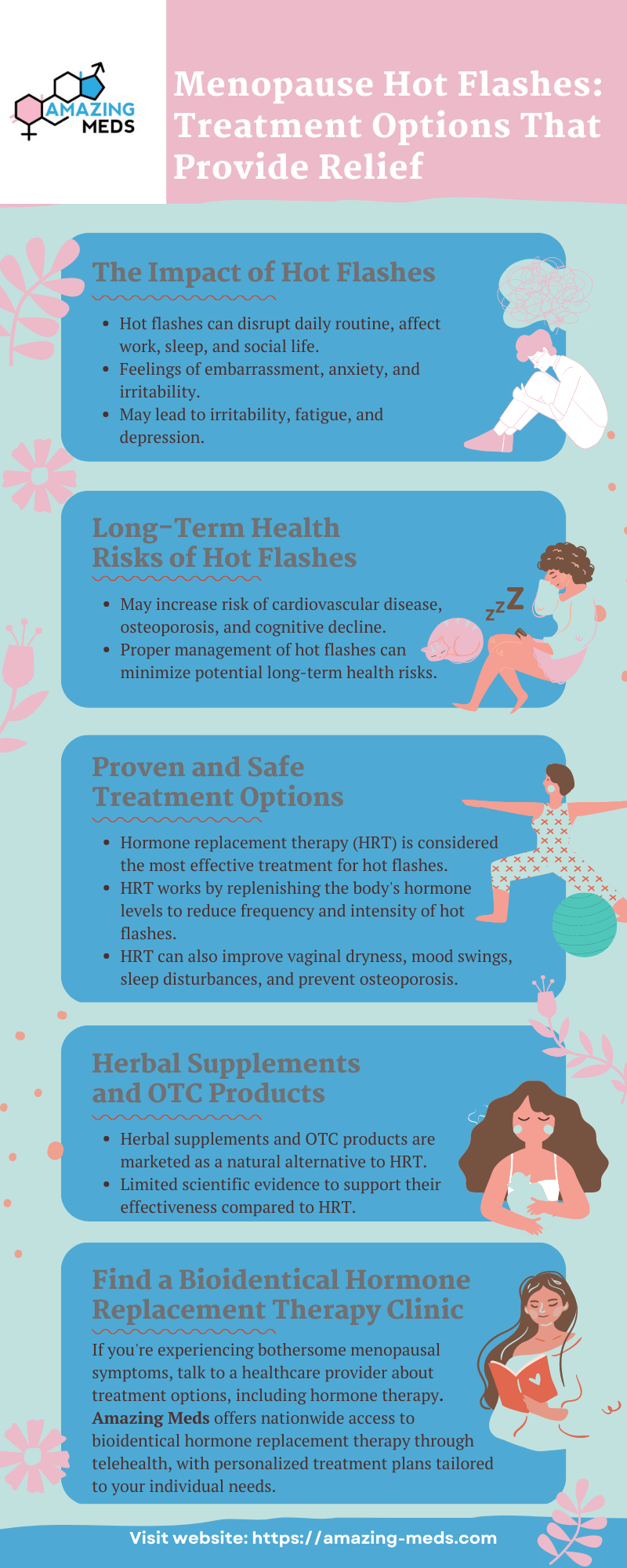Menopause Hot Flashes: Treatment Options That Provide Relief
Are you experiencing hot flashes during menopause? You’re not alone.
Menopause is a natural part of a woman’s life, but it can come with its share of symptoms, including hot flashes. Hot flashes are the most common symptom of menopause, affecting up to 75% of women. They can be intense, making it difficult to get through the day or even sleep at night and even affect your long-term health.
Fortunately, there are safe and proven treatments that can provide relief. In this article, we’ll discuss the impact of hot flashes on a woman’s life, the long-term health risks associated with them, and the best treatment options available.
Why Properly Managing Hot Flashes is Crucial
Managing hot flashes is crucial for women going through menopause.
1. Hot Flashes Impact Quality of Life
Hot flashes can disrupt your daily routine, affecting your ability to work, sleep, and socialize. They can cause feelings of embarrassment, anxiety, and irritability. This can lead to irritability, fatigue, and a decrease in overall well-being. In some cases, hot flashes may even lead to depression.
2. Hot Flashes Can Have Long-Term Health Risks
Hot flashes are not just uncomfortable; they can also increase your risk of long-term health problems. Research indicates that women who experience frequent and severe hot flashes may be at a higher risk of developing serious health issues such as cardiovascular disease and osteoporosis, and cognitive decline. Therefore, it’s essential to manage hot flashes effectively to minimize potential long-term health risks.
3. Proven and Safe Hot Flash Treatments Exist
The good news is that there are several proven and safe treatments available that can help manage hot flashes, including hormone replacement therapy (HRT) and other medications. By working with a qualified medical practitioner, women can find a treatment plan that fits their individual needs and lifestyle. It’s important to talk to a qualified medical practitioner to determine the best treatment option for you.
What Is the Best Treatment for Hot Flashes?
Hormone Replacement Therapy (HRT) is considered the most effective treatment for hot flashes. HRT is a treatment that supplements the body with estrogen and progesterone, hormones that your body is no longer producing during menopause. It can be taken in different forms, such as pills, patches, gels, and creams. By replacing the missing hormones, HRT can alleviate the symptoms of menopause, including hot flashes.
How Does Hormone Replacement Therapy (HRT) Work?
HRT works by replenishing the body’s hormone levels, which can help regulate the body’s temperature control system. This, in turn, can reduce the frequency and intensity of hot flashes. Additionally, estrogen can help with other symptoms of menopause, such as vaginal dryness, mood swings, and sleep disturbances. Progesterone, on the other hand, is added to HRT to protect the uterus from the potential cancer risk associated with estrogen alone.
What Other Menopausal Symptoms Does HRT Help Treat?
HRT is the gold standard for treating hot flashes and other menopausal symptoms. In addition to reducing the frequency and intensity of hot flashes, HRT can also improve vaginal dryness, mood swings, and sleep disturbances. Moreover, HRT can help prevent osteoporosis, a condition that weakens bones and increases the risk of fractures, which is a common concern for women after menopause.
Do Herbal Supplements or OTC Products Work as Well as HRT?
Herbal supplements and over-the-counter (OTC) products are widely available and are often marketed as a natural alternative to hormone replacement therapy (HRT) for the management of menopausal symptoms. However, there is limited scientific evidence to support the effectiveness of these products compared to HRT.
HRT is effective at reducing the frequency and severity of hot flashes and improving overall quality of life for menopausal women.
On the other hand, herbal supplements and OTC products may offer some relief for menopausal symptoms, but the evidence for their efficacy is mixed. For example, some studies have found that soy supplements and black cohosh may help reduce the frequency and severity of hot flashes, while others have found no significant benefit.
It’s important to note that herbal supplements and OTC products are not regulated in the same way as prescription drugs, meaning that their safety and effectiveness are not always well-established. Additionally, some herbal supplements may interact with prescription medications or have other adverse effects, making it essential to talk to a healthcare provider before trying any of these products.
In summary, while herbal supplements and OTC products may provide some relief for menopausal symptoms, they are generally not as effective as HRT.
When Should I Speak to a Hormone Doctor About Hot Flashes?
Hot flashes are a common symptom of menopause, but they can also occur in younger women and men due to hormonal imbalances or other medical conditions. If you’re experiencing hot flashes, it’s important to speak to a healthcare provider who can evaluate your symptoms and provide a proper diagnosis.
If you’re considering hormone replacement therapy (HRT) as a treatment option for your hot flashes, it’s important to speak to a hormone doctor who specializes in menopause. They can help you determine if HRT is the right choice for you based on your medical history, current symptoms, and individual risk factors. HRT can have both benefits and risks, so it’s important to have a thorough discussion with your healthcare provider to make an informed decision.
Where Can I Find a Hormone Doctor Specialized in Menopause?
If you are experiencing menopausal symptoms and are interested in HRT, it is important to find a qualified healthcare provider who specializes in menopause. A hormone doctor or endocrinologist can provide expert guidance on hormone replacement therapy.
Amazing Meds: Telehealth HRT for Menopausal Symptoms
One option for finding a hormone practitioner specialized in menopause is through Amazing Meds, an online telehealth provider that specializes in HRT for menopausal symptoms. Amazing Meds has a team of nurse practitioners who are experts in menopause and HRT and are available to provide online consultations from the comfort of your own home.
During your consultation, the nurse practitioner will review your medical history, symptoms, and any previous treatments you’ve tried. They may also order blood tests to check your hormone levels and determine if you’re a good candidate for HRT. If you are, the nurse practitioner will work with you to develop a personalized treatment plan that may include hormone replacement therapy, lifestyle changes, and other therapies as needed.
At Amazing Meds, you can rest assured that you’ll receive high-quality care from experienced professionals who specialize in menopause and hormone replacement therapy. They are committed to helping you manage your symptoms and improve your quality of life during this important stage of life.
To learn more about our Online HRT option, please visit the following page: https://amazing-meds.com/online-hrt-clinic/
Frequently Asked Questions
What Can Trigger a Hot Flash?
Hot flashes can be triggered by various factors, such as stress, alcohol consumption, spicy foods, caffeine, and smoking. It is helpful to identify and avoid triggers to reduce the frequency and intensity of hot flashes. Learn more about the causes of hot flashes here.
What Does a Hot Flash Feel Like?
A hot flash is a sudden feeling of intense heat, often accompanied by sweating and flushing of the face, neck, and chest. Some women may also experience a rapid heartbeat, chills, or a feeling of anxiety or panic.
What Happens Physiologically During a Hot Flash?
During a hot flash, the body’s core temperature rises, triggering the sweat glands to produce sweat in an attempt to cool down. The dilation of blood vessels near the skin’s surface also causes flushing and increased blood flow, which can contribute to the feeling of warmth.
What Are Lifestyle Factors That Can Exacerbate Hot Flashes?
Lifestyle factors that can exacerbate hot flashes include a sedentary lifestyle, obesity, smoking, and high-stress levels. Regular exercise, a healthy diet, and stress reduction techniques like yoga or meditation can help reduce the frequency and severity of hot flashes.
What Causes Hot Flashes Besides Menopause?
Hot flashes can also be caused by medical conditions or treatments, such as hyperthyroidism, chemotherapy, or radiation therapy. It is essential to speak with a healthcare provider to rule out any underlying medical conditions that may be causing hot flashes.
How Effective is Hormone Replacement Therapy for Hot Flashes?
Hormone Replacement Therapy (HRT) is the most effective treatment for hot flashes, with up to 80% of women experiencing significant relief. HRT works by replacing the declining levels of estrogen and progesterone in the body, which can help alleviate hot flashes and other menopausal symptoms.
How Can I Start Hormone Replacement Therapy?
If you are experiencing hot flashes and are interested in starting HRT, it is important to speak with a healthcare provider who specializes in menopause. They can help to determine if HRT is right for you and guide you through the process of starting treatment. Telehealth providers like Amazing Meds can offer convenient and safe access to hormone providers who can prescribe HRT online.

